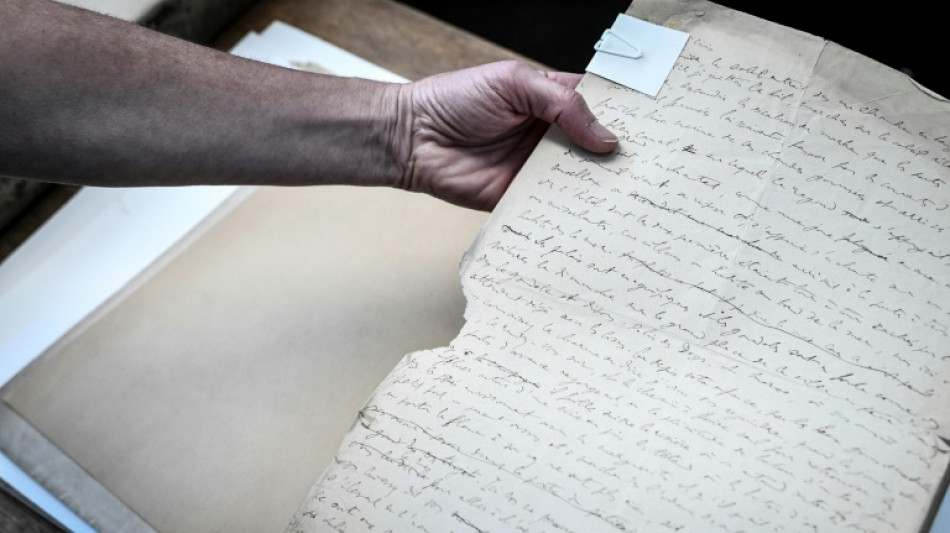
-
 Dutch PM-elect Jetten says not yet time to talk to Putin
Dutch PM-elect Jetten says not yet time to talk to Putin
-
Social media fuels surge in UK men seeking testosterone jabs

-
 Forest face Fenerbahce, Celtic draw Stuttgart in Europa League play-offs
Forest face Fenerbahce, Celtic draw Stuttgart in Europa League play-offs
-
US speed queen Vonn crashes at Crans-Montana, one week before Olympics

-
 Trump nominates former US Fed official as next central bank chief
Trump nominates former US Fed official as next central bank chief
-
New Dutch government pledges ongoing Ukraine support

-
 Newcastle still coping with fallout from Isak exit, says Howe
Newcastle still coping with fallout from Isak exit, says Howe
-
Chad, France eye economic cooperation as they reset strained ties

-
 Real Madrid to play Benfica, PSG face Monaco in Champions League play-offs
Real Madrid to play Benfica, PSG face Monaco in Champions League play-offs
-
Everton winger Grealish set to miss rest of season in World Cup blow

-
 Trump brands Minneapolis nurse killed by federal agents an 'agitator'
Trump brands Minneapolis nurse killed by federal agents an 'agitator'
-
Arteta focuses on the positives despite Arsenal stumble

-
 Fijian Drua sign France international back Vakatawa
Fijian Drua sign France international back Vakatawa
-
Kevin Warsh, a former Fed 'hawk' now in tune with Trump

-
 Zverev rails at Alcaraz timeout in 'one of the best battles ever'
Zverev rails at Alcaraz timeout in 'one of the best battles ever'
-
Turkey leads Iran diplomatic push as Trump softens strike threat

-
 Zelensky backs energy ceasefire, Russia bombs Ukraine despite Trump intervention
Zelensky backs energy ceasefire, Russia bombs Ukraine despite Trump intervention
-
'Superman' Li Ka-shing, Hong Kong billionaire behind Panama ports deal

-
 Skiing great Lindsey Vonn crashes at Crans-Montana, one week before Olympics
Skiing great Lindsey Vonn crashes at Crans-Montana, one week before Olympics
-
Slot warns Liverpool 'can't afford mistakes' in top-four scrap

-
 Paris show by late Martin Parr views his photos through political lens
Paris show by late Martin Parr views his photos through political lens
-
Artist chains up thrashing robot dog to expose AI fears

-
 Alcaraz outlasts Zverev in epic to reach maiden Australian Open final
Alcaraz outlasts Zverev in epic to reach maiden Australian Open final
-
French PM forces final budget through parliament

-
 French-Nigerian artists team up to craft future hits
French-Nigerian artists team up to craft future hits
-
Dutch watchdog launches Roblox probe over 'risks to children'

-
 Trump brands Minneapolis nurse shot dead by federal agents an 'agitator'
Trump brands Minneapolis nurse shot dead by federal agents an 'agitator'
-
Israel says killed 'three terrorists' in Gaza

-
 After Trump-fueled brawls, Canada-US renew Olympic hockey rivalry
After Trump-fueled brawls, Canada-US renew Olympic hockey rivalry
-
Eileen Gu - Olympic champion who bestrides rivals US, China

-
 Trump, first lady attend premier of multimillion-dollar 'Melania' documentary
Trump, first lady attend premier of multimillion-dollar 'Melania' documentary
-
US Senate eyes funding deal vote as government shutdown looms

-
 Cuddly Olympics mascot facing life or death struggle in the wild
Cuddly Olympics mascot facing life or death struggle in the wild
-
UK schoolgirl game character Amelia co-opted by far-right

-
 Anger as bid to ramp up Malaysia's football fortunes backfires
Anger as bid to ramp up Malaysia's football fortunes backfires
-
Panama court annuls Hong Kong firm's canal port concession

-
 Pioneer African Olympic skier returns to Sarajevo slopes for documentary
Pioneer African Olympic skier returns to Sarajevo slopes for documentary
-
Trump threatens tariffs on nations selling oil to Cuba

-
 From fragile youngster to dominant star, Sabalenka chases more glory
From fragile youngster to dominant star, Sabalenka chases more glory
-
Lowly Montauban 'not dead' in French Top 14 survival hunt

-
 'Winter signing' Musiala returns to boost weary Bayern
'Winter signing' Musiala returns to boost weary Bayern
-
Elena Rybakina: Kazakhstan's ice-cool Moscow-born Melbourne finalist

-
 Power battle as Sabalenka clashes with Rybakina for Melbourne title
Power battle as Sabalenka clashes with Rybakina for Melbourne title
-
Contrasting fortunes add Basque derby edge for Matarazzo's revived Sociedad

-
 Asian stocks hit by fresh tech fears as gold retreats from peak
Asian stocks hit by fresh tech fears as gold retreats from peak
-
Kim vows to 'transform' North Korea with building drive

-
 Peers and Gadecki retain Australian Open mixed-doubles crown
Peers and Gadecki retain Australian Open mixed-doubles crown
-
Britain's Starmer seeks to bolster China ties despite Trump warning

-
 Kaori Sakamoto - Japan skating's big sister eyes Olympic gold at last
Kaori Sakamoto - Japan skating's big sister eyes Olympic gold at last
-
Heavy metal: soaring gold price a crushing weight in Vietnam


A bluffer's guide to Proust 100 years after his death
France's Marcel Proust, who died 100 years ago on Friday, is regarded as one of the greatest novelists of all time -- but few can truthfully claim to have read his 2,400-page masterpiece "In Search of Lost Time".
For those waiting for another lockdown to curl up with his magnum opus, here are five fun facts you can drop into a conversation that will make you sound like an expert.
- Unwanted masterpiece -
In 1909 Proust launched himself into what would become his masterwork, a novel about memory and the essence of art.
The project grew from one book to a second in 1912 and a third the following year.
"In Search of Lost Time" eventually grew into seven volumes, four published in Proust's lifetime and three after his death at the age of 51 in 1922.
But finding a publisher was not easy.
After receiving three rejections for the first volume "Swann's Way", Proust decided to self-publish, with the help of Grasset publishing house.
Nobel-winning novelist Andre Gide, who was an editor at the time at NFR publishing house (which later became Gallimard), was among those who passed on Proust's dense prose.
"The rejection of this book will remain the NRF's greatest mistake," Gide later wrote to Proust, calling it "one of the most bitter regrets of my life".
Gallimard managed to lure Proust back with his second novel in 1916, "In the Shadow of Young Girls in Flower", which won the Goncourt Prize, France's top literary award.
- 'Oh': on winning top prize -
When the Goncourt jury announced Proust as the winner in 1919, Gallimard rushed to give the author the good news.
Arriving at his home near the Champs-Elysees, Gallimard found Proust, an inveterate snoozer, asleep in a room filled with steam treatments for his asthma.
"Oh?" said the author flatly, on hearing he had won the literary equivalent of the jackpot.
His win sparked an outcry by the French left which backed Roland Dorgeles' epic account of life in the trenches in World War I over what they characterised as Proust's self-indulgent ruminations on the passage of time.
Proust's critics further argued he was too old -- he was 48 at the time -- and too rich to win the award which came with 5,000 francs in prize money.
- On and on and on -
"For a long time, I went to bed early...", is how "In Search of Lost Time" begins, and it's also how the story ends for many a reader, who find Proust's prose to have soporific qualities.
Poetic and dreamy, sprinkled with dashes and parentheses, his sentences are exceptionally long -- on average 30 words, twice that of most novelists.
- The madeleine was nearly toast -
The madeleine or mini sponge cake that has become the most famous detail in all seven volumes makes its appearance early in the first book.
For the protagonist, Marcel, tasting the little cake releases a flurry of vivid memories, giving him access to the "lost time" he is searching for.
"As soon as I had recognised the taste of madeleine dipped in lime-blossom tea that my aunt used to give me...", he swoons.
And yet the mighty madeleine was nearly a humble piece of toast, as early drafts of the scene discovered in Proust's notebooks reveal.
- Maternal mollycoddling -
Proust suffered most of his life with severe asthma, and although he liked to socialise -- he had some torturous secret homosexual love affairs -- he also spent long stretches in bed, writing with a tray on his knees.
His neurologist father urged his sickly son to get out in the fresh air and play sport, noting that asthma was not contagious.
But Proust's mother was prone to mollycoddling, and from 1906 he followed her counsel, staying cloistered inside like a hermit, with a steady supply of caffeine and aspirin.
His respiratory problems would finally get the better of him. He died after pneumonia that turned into bronchitis and then an abscess on the lungs.
O.Bulka--BTB


